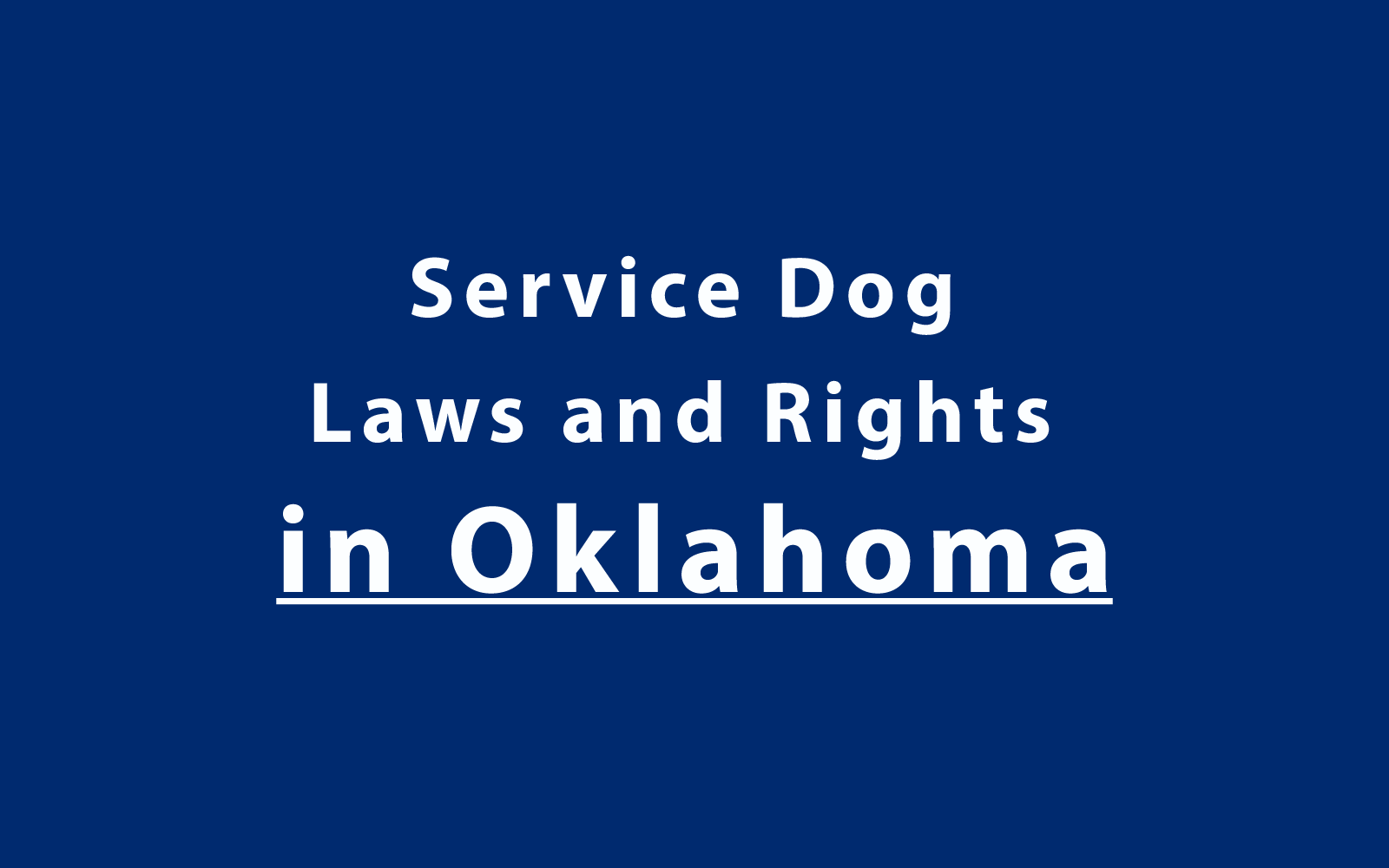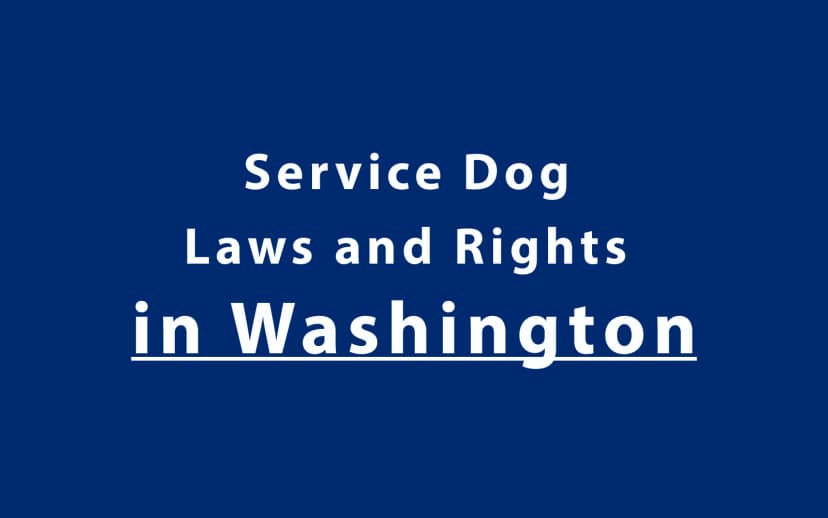Service Dog Laws and Rights in Oklahoma

Service dogs are indispensable for many Oklahomans living with disabilities. From guiding individuals with visual impairments to alerting someone to an oncoming seizure or providing deep pressure therapy during a panic attack, these highly trained dogs are not just companions—they are working partners.
Understanding the laws that protect the rights of service dog handlers is essential for accessing public spaces, securing housing, maintaining employment, and traveling safely. While federal laws such as the Americans with Disabilities Act (ADA) provide nationwide protections, Oklahoma also enforces its own statutes to ensure these rights are respected.
In this 2025 guide, we’ll explore the complete legal landscape surrounding service dogs in Oklahoma—helping handlers, business owners, landlords, educators, and transportation providers know what to expect and how to comply.
Legal Definition of a Service Dog in Oklahoma
Under the ADA, a service dog is defined as a dog that is individually trained to do work or perform tasks for an individual with a physical, sensory, psychiatric, intellectual, or other mental disability. These tasks must directly relate to the person’s disability.
Examples of valid tasks include:
- Guiding a person who is blind
- Assisting with balance or retrieving dropped items
- Alerting to seizures, low blood sugar, or oncoming panic attacks
- Interrupting self-harming behaviors
- Reminding a person to take medication
Oklahoma Statutes Title 7 § 7-113 aligns with this federal definition, ensuring statewide consistency in how service animals are recognized and protected.
❗ Note: Emotional Support Animals (ESAs), comfort animals, and therapy animals do not qualify as service dogs under ADA or Oklahoma law. While they may be protected in housing, they are not permitted the same public access rights.
Public Access Rights in Oklahoma
Under both federal ADA law and Oklahoma Statutes Title 7 §§ 7-114 to 7-115, individuals with service dogs have the right to access all public accommodations, including:
- Restaurants and cafes
- Hotels and motels
- Retail stores and shopping centers
- Public parks and recreation areas
- Hospitals and clinics
- Government buildings
- Libraries, museums, and theaters
- Public transportation systems
Business Owners May Only Ask:
- Is this a service animal required because of a disability?
- What task has the dog been trained to perform?
They cannot ask for certification, demand the dog perform a task on the spot, or inquire about the nature of the handler’s disability.
Handler Responsibilities:
- Dog must be under control (leash, harness, or voice/signal command).
- Dog must be housebroken and well-behaved in public.
- Handlers are responsible for any damages caused by the animal.
Businesses may legally deny access if the dog is disruptive, aggressive, or poses a direct threat to health or safety.
Housing Rights for Service Dog Handlers
The Fair Housing Act (FHA) applies in Oklahoma, giving individuals with disabilities the right to live with service dogs (and in some cases, ESAs), even in “no pet” housing.
Landlords Must:
- Provide reasonable accommodations
- Not charge pet fees or deposits for service dogs
- Not impose breed or size restrictions
- Respect the tenant’s rights without retaliation
Landlords May Request (If Not Obvious):
- A letter from a licensed healthcare provider verifying the need for the dog
- Confirmation that the dog performs specific tasks or provides necessary support
Landlords may not:
- Demand registration or certification
- Ask for training records
- Reject the accommodation based on insurance policy or personal bias
If you’re denied housing, you may file a complaint with the U.S. Department of Housing and Urban Development (HUD) or the Oklahoma Human Rights Commission.
Employment Rights in Oklahoma
Title I of the ADA guarantees the right to reasonable accommodation in the workplace for individuals with disabilities, including the use of service dogs.
Oklahoma also enforces workplace anti-discrimination protections under the Oklahoma Anti-Discrimination Act.
How to Request an Accommodation:
- Notify your employer in writing.
- Submit documentation from a medical professional, if requested.
- Work collaboratively with HR or management to implement the accommodation.
Employers must allow service dogs unless doing so would create an undue hardship—such as significant disruption or risk to workplace safety.
Employees who experience discrimination may file a complaint with the Equal Employment Opportunity Commission (EEOC) or the Oklahoma Human Rights Commission.
Travel and Transportation Rights
Air Travel (ACAA)
The Air Carrier Access Act allows service dogs, including psychiatric service dogs (PSDs), to fly in the cabin with their handler at no extra charge.
Requirements:
- Submit the DOT Service Animal Transportation Form
- The dog must remain under control and fit within the handler’s foot space
- Airlines may not deny access based on breed
Ground Transportation
Public and private transportation providers in Oklahoma must comply with ADA regulations. This includes:
- EMBARK (Oklahoma City transit)
- Tulsa Transit
- Amtrak
- Taxis and ride-hailing services (Uber, Lyft)
Service dogs must be accommodated without added fees. If access is denied, report the incident to the company and to the U.S. Department of Transportation or local authorities.
Educational Access: Schools and Colleges
K–12 Public Schools
Under IDEA and Section 504, Oklahoma public schools must allow qualified students to bring their trained service dogs.
- Schools may request a statement of necessity, but not certification
- The student or guardian is typically responsible for handling the dog during school hours
Higher Education Institutions
Colleges and universities in Oklahoma must comply with ADA Title II (public) or Title III (private), and cannot deny access to service dogs.
- Students should contact the school’s Disability Services Office
- The school may ask:
- What tasks the dog is trained to perform
- If the dog meets basic hygiene and behavior standards
- Schools cannot require registration, fees, or deny access based on breed
Service Dog Training and Registration in Oklahoma
Neither federal nor Oklahoma law requires a service dog to be professionally trained or registered. Handlers may legally train their own dogs.
However, voluntary registration can help:
- Prevent misunderstandings in public
- Facilitate smoother travel and housing interactions
- Demonstrate a handler’s preparedness
At AssistanceDogPartners.org, we provide:
- Optional service dog registration kits
We focus on teaching obedience, public behavior, and disability-specific tasks such as psychiatric alert, mobility assistance, and more.
Service Dog Fraud and Misrepresentation
Falsely claiming a dog as a service animal is a misdemeanor offense in Oklahoma.
Under Title 7 § 7-118, knowingly misrepresenting a pet as a service dog may result in:
- Fines
- Misdemeanor charges
- Community service requirements
Fraudulent claims include:
- Using a vest or ID for an untrained pet
- Entering restricted areas with a non-service dog
- Falsely identifying an ESA or therapy animal as a service dog
To report fraud, contact local law enforcement or the Oklahoma Attorney General’s Office.
State and Local Resources
- Oklahoma Human Rights Commission – https://oklahoma.gov/ohrc
Handles discrimination complaints for housing, access, and employment.
- Oklahoma Department of Rehabilitation Services – https://www.okdrs.gov
Offers support, training, and vocational rehabilitation for individuals with disabilities.
- Disability Rights Oklahoma – https://www.droklahoma.org
Legal advocacy and protection for disabled residents.
- Local training organizations in Oklahoma City, Tulsa, Norman, and Edmond provide task training, public access instruction, and group classes.
Frequently Asked Questions
Do I have to register my service dog in Oklahoma?
No. Registration is not legally required but can help in certain scenarios.
Are psychiatric service dogs (PSDs) legally protected?
Yes. If they are trained to perform tasks related to a disability, they are fully protected under the ADA and Oklahoma law.
Can a landlord refuse my service dog?
No. Landlords must make reasonable accommodations and cannot charge pet fees.
What if a business refuses my service dog entry?
Calmly explain your rights. If the refusal continues, file a complaint with the Oklahoma Human Rights Commission or the U.S. Department of Justice.
Can my employer say no to my service dog?
Only if the dog creates an undue hardship or safety concern. Otherwise, employers are required to explore reasonable accommodations.
Conclusion
Oklahoma supports strong protections for service dog handlers through both federal and state laws. From public access and housing to employment and education, service dog teams are guaranteed equal opportunities to live, work, travel, and learn with dignity and independence.
By staying informed, training your dog to high standards, and advocating for your rights when needed, you can navigate life confidently as a service dog handler.
At AssistanceDogPartners.org, we’re here to support you every step of the way—with training tools, optional registration, and a community committed to accessibility and empowerment.



